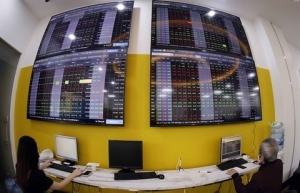Liquidity remains under pressure despite stability
At VIR’s “Choose a Category” series of talk shows, under last week’s topic of market liquidity through the lens of investment funds, experts from PVI Asset Management shared information on such liquidity issues in Vietnam’s capital market.
 |
| The two experts discussed the liquidity issue on last week’s talk show |
Mai Cuong, deputy director of Business Development at PVI, said the market has had a very tough time in the recent past. “Market liquidity is seriously decreasing, and cash flow is moving into other investment channels, while market confidence is also declining,” Cuong said.
It comes from both subjective and objective reasons, partly because the macroeconomic situation globally, and in Vietnam in particular, has impacted liquidity on the bond market.
Meanwhile, Cao Minh Hoang, investment director of PVI, added that liquidity of current capital markets, including the stock market and bond markets, is rapidly declining. Market valuation has plummeted and asset turnover of market participants and investors has slowed down, Hoang explained.
As such, investors are also observing the market and looking forward to supportive policies from regulators to develop the capital market in a sustainable way. Hoang suggested that the regulator could increase the amount of currency circulating in the market to support investors during this period, while Cuong suggested that market entities, including investors and issuers, need to discuss more in order to root out the problems.
Through working with a number of large investment funds and securities companies, PVI has said that these companies are making efforts to respond when individual investors withdraw capital or sell their assets. Therefore, such entities need to prepare measures to prolong payment plans, help the market develop stably and sustainably, and avoid selling off high-value assets that led to much loss.
“Transparent information thanks to the parties being calm together to determine problems will partly prevent capital withdrawal,” said Cuong.
PVI forecasts that the market will return to stability by the end of the year. However, many unforeseeable external factors were also pointed out.
Hoang said most unpredictable factors come from outside Vietnam, significantly affecting policy management and interest rates. For example, the US is under great pressure to raise interest rates, which are expected to increase to 5 per cent, or even 5.5 per cent in 2023. This will put great pressure on Vietnam’s exchange rate, and its interest rates will be forecast to continue to increase next year as a result.
In the context of rising interest rates, the market’s liquidity will continue to be under pressure, and the two experts suggested that it is necessary to pump more money than during a period of stable liquidity.
 | Market likely to continue under sell-off pressure The Vietnamese stock market experienced a choppy week, with the VN-Index falling to below 1,000 points before bouncing back to 1,027.36. Analysts believed that besides strong selling pressure and increased mortgage settlement during the downtrend, investors were also negatively affected by the movements in interest rates, exchange rates, and bond markets. |
What the stars mean:
★ Poor ★ ★ Promising ★★★ Good ★★★★ Very good ★★★★★ Exceptional
Related Contents
Latest News
More News
- Private capital funds as cornerstone of IFC plans (February 20, 2026 | 14:38)
- Priorities for building credibility and momentum within Vietnamese IFCs (February 20, 2026 | 14:29)
- How Hong Kong can bridge critical financial centre gaps (February 20, 2026 | 14:22)
- All global experiences useful for Vietnam’s international financial hub (February 20, 2026 | 14:16)
- Raised ties reaffirm strategic trust (February 20, 2026 | 14:06)
- Sustained growth can translate into income gains (February 19, 2026 | 18:55)
- The vision to maintain a stable monetary policy (February 19, 2026 | 08:50)
- Banking sector faces data governance hurdles in AI transition (February 19, 2026 | 08:00)
- AI leading to shift in banking roles (February 18, 2026 | 19:54)
- Digital banking enters season of transformation (February 16, 2026 | 09:00)

 Tag:
Tag:



















 Mobile Version
Mobile Version